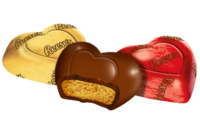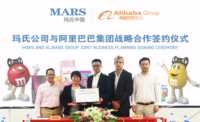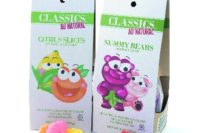
When the executive team of Riclan S.A. decided to purchase 52 acres of land (210,000 sq. meters) just outside of Rio Claro in 2003, they did so in the belief that the area would accommodate more than just a new distribution center.
After
all, the Brazilian producer of hard and soft candies, caramels, lollipops,
gummies, chewing gums and cereal bars, was experiencing a 15% annual growth
rate, one that reflected gains both in domestic as well as export markets.
Having
established itself as an adroit exporter of confections back in 1973 - it was
the first Brazilian confectionery company to do so - Riclan was quick to adapt
to the necessary product standards expected from international buyers,
particularly from the world’s single largest market, the United States.
Riclan’s executives Mario Schneider and
Oswaldo Grissotto, descendants of founders Mario
Schraider and Irene Grisotto Teixeira,
understood the importance of manufacturing prowess, of investing
in automation and the latest processing and packaging technology to not only
establish a beachhead in exporting, but guarantee a gateway for continued,
sustainable growth.
Their
decision to build a 183,000-sq.-ft. manufacturing complex in downtown Rio Claro about 100 northwest of Sao Paulo in 1972 underscored a commitment to
the future, one that’s being repeated today.
Riclan’s
third generation looks to build on that commitment established several decades
ago by pursuing the same kind of farsighted investments. It’s in this manner
that a 66-year-old tradition of producing branded and licensed confections that
sweeten consumers lives in Brazil
and abroad can continue.
As a result, in August 2006, the
company began construction of a new warehouse on the acreage it purchased three
years earlier. Upon completion of the warehouse in June 2007, construction began
on a new production facility. The following year in May, the company installed the
first of six hard candy production lines within the new 204, 514- sq.-ft.-
plant (19,000 sq. meters). The sixth hard candy line just went into production
this past August.
Today, the company produces a
variety of candies, including its Freegells Candy Stick product, Freegells Double Twist, Pocket Candy (in
pillow pack, coffee flavor and some fruit flavors varieties) and Sugarless Freegells, which come in a new
flip-top box.
Despite
current projections from the Brazilian confectionery association showing sugar
confections falling off and chocolate consumption increasing, Ivan Schraider,
director of domestic operations and Mario’s son, sees continued strong sales
growth domestically and abroad.
Noting
that Riclan was the first company in Brazil to produce cough candy with the Frigells brand, a brand that’s evolved
to being one of the leading “drops” candies in the category, Ivan expects the
same kind of new product innovation to stimulate double-digit sales gains. Last
years, sales reached $130 million.
Currently,
branded sales comprise 60% of all revenues, with private label accounting for
the remainder. Licensed confections account for a substantial portion of the
company’s business – it is the largest licensee of confections in Central and
South America – and the company continues to pursue only the most popular
connections, such as Barbie, Hello Kitty,
Hot Wheels, High School Musical, The PowerPuff Girls and Speedo.
Exports,
which have continued to grow since 1973 and encompass 50 countries, now account
for nearly 30% of the company’s revenues. Antonio Roumualdo Da Silva,
international business director for the company, projects a 20% growth rate
during the next three years.
Part
of the success story behind Riclan’s dynamism revolves around new product
rollouts as well as continued improvements in manufacturing efficiency, which
keeps the company competitive in Brazil and overseas.
This
year, the company will launch 20 new products featuring new flavors, formats
and formulas. Some of the new rollouts include Croc, juice-filled bubble gum, Freegells
oral mints in Deep Blue and Polar flavors, Freegells
hard candy with cream fillings, Bubble Gum Kits (Barbie and Hot Wheels) which
feature one bubble gum, two sticks of gums and one tattoo, Freegell Artic breath strips and My Toffee in chocolate and strawberry flavors.
The
focus on new product development dovetails with added emphasis on boosting
efficiency and trimming manufacturing costs.
“Since
the installation of processing lines in our $15-million plant, efficiency has
improved 8% and productivity 10%,” says Ivan. Part of those efficiency and
productivity gains stem from increased operating space and improved product
flow.
The
company has also received SGS certification for its facilities and has been
audited by Mattel, Inc. for the past 15 years as an approved supplier.
Currently,
plans call for a new $1-million confectionery line to go on-stream early next
year. By 2013, all of the company’s six production lines at its original
manufacturing complex in downtown Rio Clara will have moved to the new
manufacturing complex, which will be expanded accordingly.
That’s
when the company believes it will be
time to shift into yet another higher gear.
At
a Glance
Company:
Riclan S.A.
Headquarters:
Rio Clara, Brazil
Sales:
$130 million: 1944
Plants:
Two, both in Rio Clara (183,000 sq. ft. and
214, 514 sq. ft.)
Employees:
1,100
Management
team: Mario Schraider Jr. , president; Oswaldo Grisotto Jr., director; Antonio Romualdo Silva, international business
director, Ivan Schraider, domestic business director.





